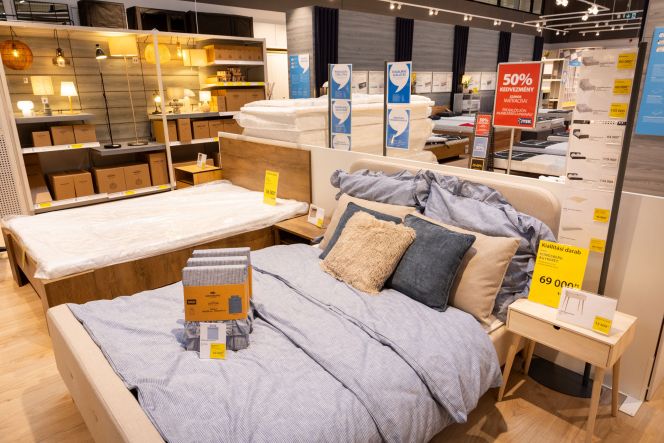JYSK’s latest representative research examined the sleeping habits and problems of the Hungarian population. The results were presented by the retail chain’s strategic partner, the Hungarian Sleep Association. The quality of sleep of the respondents shows a varied picture. Half of the respondents mostly sleep enough, but only 39% of them wake up rested. Half of the respondents do not achieve the appropriate amount of sleep in their own opinion, and the proportion of those who wake up tired is even higher.
On average, the respondents indicated two sleep problems, the most common of which are waking up at night and difficulty falling asleep. 57% of the respondents regularly wake up during the night, while 44% have difficulty falling asleep. 29% reported that they snore at night. 39% of the respondents have difficulty waking up, and half of the respondents struggle with joint pain in the morning. Only 12 percent wake up without complaints.
The values shown in the figures are shown in percentages. Deviations of +/- 1% from 100% may occur due to rounding rules. The figure illustrating the frequency of sleep disorders shows the incidence rate of a given sleep disorder in the measured representative sample (respondents could mark more than one answer for this question).
The quality of sleep has a critical impact on many areas of life, including work performance, concentration, and physical and mental health. Sleep problems impair everyday performance, well-being, impair concentration, reduce reaction time, and increase stress. Chronic sleep deprivation carries serious health risks.
Many people may feel more tired during the cold and dark winter months. However, it is possible that it is not darkness or depression that causes winter fatigue, but an inadequate bed. JYSK’s recent sleep study examined the possible causes of poor sleep, including the sleeping conditions of Hungarians.
Sleep conditions may be the cause
Sleep quality is influenced by many factors, including stress, artificial light, breathing problems and an unsuitable sleeping position. A mattress that is too soft or too hard, as well as inadequate spinal support, can contribute to poor sleep. “When choosing a mattress, the most important considerations are comfort and support, so that sleep is restful and supports a healthy back,” said György G. Németh, president of the Hungarian Sleep Association.
In terms of beds, foam mattresses (36%) and spring mattresses (24%) are the most popular, but many, 24% of respondents, sleep on a couch or sofa bed, which may not be suitable for comfortable and healthy sleep in the long term.
The values shown in the figures are shown in percentages. Deviations of +/- 1% from 100% may occur due to rounding rules.
Soft mattresses are very rare, 88% of respondents sleep on a medium-hard, hard or very hard mattress, although this may not be ideal for everyone. The appropriate mattress hardness depends on body weight, typical sleeping position and body shape.
The thickness and hardness of the mattress help provide proper support and better weight distribution to relieve pressure points. The real winter mattress champions are memory foam mattresses, as they adapt to the shape of the body and retain heat. Some mattresses can also help maintain a comfortable sleeping temperature, which is the key to falling asleep quickly. Once you have found the right mattress, it is worth taking care of it. A mattress protector can help with this, protecting the mattress from dirt, thus extending its lifespan.
There is a division in terms of mattress replacement. One third of respondents have never replaced a mattress, while another third change it more than every 10 years. 36% will replace their mattress within 10 years. Mattresses can be considered a special product, because in addition to the price-performance ratio (47%), other factors, such as comfort (45%), firmness (34%), and size (32%), are almost equally important to consumers.
The values shown in the figures are shown in percentages. Deviations of +/- 1% from 100% may occur due to rounding rules. The figure illustrating consumer preferences shows the incidence rate of the given preference in the measured representative sample (respondents could mark more than one answer for this question).
A conscious choice of sleeping accessories is also important
We should not forget the importance of sleeping accessories – such as pillows, duvets and mattress protectors. These devices are closely related to the comfort and support of the body, which play a key role in regenerative sleep.
According to JYSK research, 67% of Hungarians sleep on their side, 16% on their stomach and 10% on their back. Therefore, it is particularly important to choose a pillow that is adapted to their sleeping position. For example, side sleepers are recommended to use a thicker pillow that provides adequate support for the head and spine, while back sleepers can use a thinner, ergonomic pillow to help maintain optimal posture. Stomach sleepers should pay special attention to ensuring that the pillow does not raise their head too much, which can strain the neck. Feather pillows are chosen by 23% of respondents, synthetic fiber pillows by 21%, and memory foam pillows by 20%.
The values shown in the figure are expressed in percentages. The +/- 1% deviation from 100% is due to rounding rules.
According to JYSK’s research, down duvets (23%), synthetic duvets (21%) and wool duvets (16%) are the most popular choices, and everyone can find the most comfortable type for themselves.
The values in the figures are expressed in percentages. The +/- 1% deviation from 100% is due to rounding rules.
From the beginning of this year, all JYSK textile products, such as bed linen, towels, duvet covers, pillows and blankets, will only use cotton from more sustainable sources – so customers can consider their health and comfort as well as their environmental impact when shopping.
We can also get personalized advice
Satisfaction with sleeping conditions shows a mixed picture: 20% are not satisfied with their bed, 30% say there is still room for improvement, and 50% feel that their sleeping accessories and mattress fully meet their needs. This also confirms that conscious choice and expert advice are key to improving the quality of sleep.
Expert support and a wide range of products available in JYSK stores provide everyone with the opportunity to find the sleeping accessories that best suit their sleeping habits and needs, contributing to truly restful nights. Improving people’s sleep is of paramount importance to the retail chain, which is why the Hungarian Sleep Association also recognized the company with the Sleep-Friendly Company Award. “At JYSK, we pay special attention to good sleep, which is why a mattress studio awaits customers in every store, where qualified colleagues help them choose the most suitable mattresses, pillows, blankets and mattress protectors, as these play an equally important role in restful sleep in winter and summer,” said Krisztina Szilvási, Head of Communications at JYSK.
The research was commissioned by JYSK, in collaboration with market researcher Opinio. Data collection date: end of October 2024. Total sample: 1,118 people. The results are representative of the entire population aged 16 to 69 – by age, gender, educational level, place of residence, type of settlement and region.
-theGeek-

















Leave a Reply